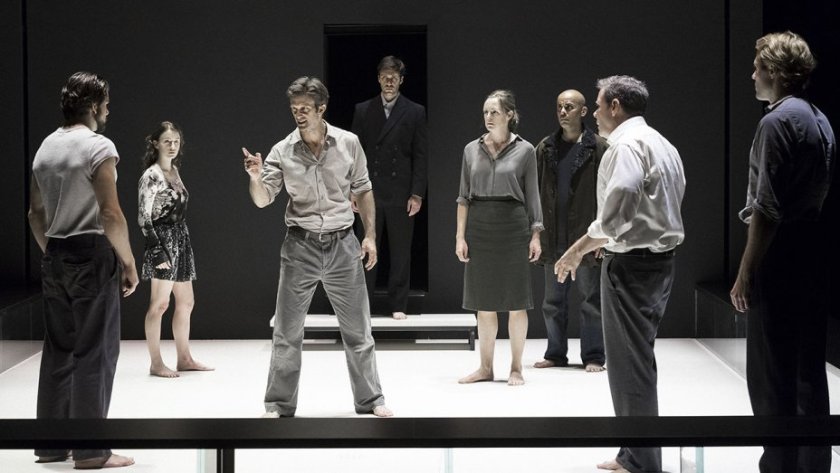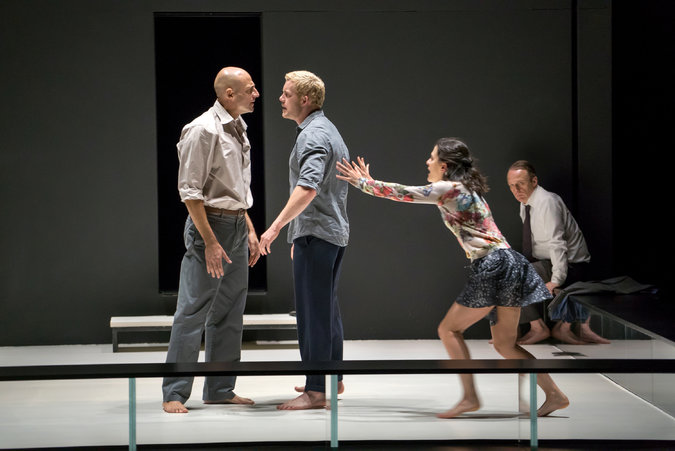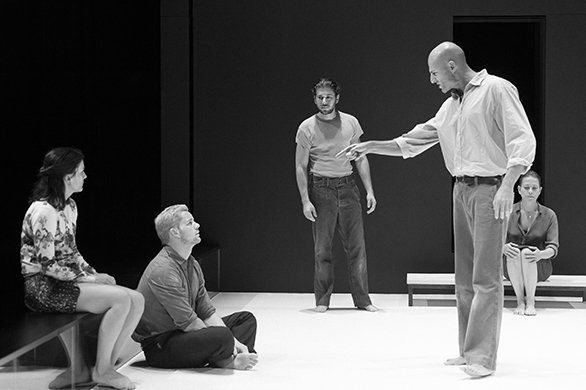
The LA and Kennedy Center cast
Dear friends and readers,
I’m told that Ivo Van Hove’s New York City production of Arthur Miller’s A View from the Bridge, which rightly received rave reviews as a production, though not as a play, when it played in New York is not attracting the full house it should at the Kennedy Center. Granted, I was row H on the side (next to a friendly couple who had also bought at the last moment); but all around us were empty seats. So I write to urge everyone who has a chance to see this production (no matter if other actors, at any rate in this case all superb), if it comes near to you. It speaks to our dire situation in the US gov’t today.
It’s not that the play concerns immigrants but its core depiction of Eddie, as a rawly emotional deeply resentful sexually sick white male (Mark Strong in NYC, here Frederick Weller of Center Theater, LA repertoire group) at the center. The story is this: Eddie’s childless wife, Beatrice (Andrus Nichols, Center Theater) has invited two male relatives from a starving place in Sicily, Marco (Alex Escola, Center Theater) and Rodolpho (Dave Register, Russell Tovey did this part in NYC) to sneak illegally into the USA to do hard labor on the waterfront. Eddie is all generosity, offering bedding (a place on the floor of an extra small room), meals, but is more concerned with his niece, Catherine (Catherine Combs) who wants to take a job outside the home. He claims to want her to stick to her studies, but since these are not college, but stenography and typing alone, whose intention is to enable her to take a job, he is on weak ground. She wants to work for money badly, to be independent.

The London production
A fierce struggle ensues in which she wins but we see with many concessions to his male pride: he is in a continual vigilant posture towards her: why is that skirt so short, why wear high heels. She is continually trying to placate him. Marco is there to get money to send home to a wife and four children, which he duly does, but Rodolpho is unattached, and he and Catherine begin to go out and fall in love. Eddie is incensed, and becomes aggressively hostile at first just to his niece and wife, sowing doubt about the man’s motives and character. He loathes that Rodolpho can sing like rock star, that he can cook, he sews, and begins to say explicitly Rodolpho is there to marry Catherine so he can become a citizen and then desert her “for the big time.” That’s why Rodolpho wants to take Catherine to Broadway, not because the movies there are fun, or plays, or lively street life. He insinuates that Rodolpho is gay, “not right” (he does not use the word pervert but we feel it in the air). He becomes ugly before Rodolpho. Beatrice moves from mild expostulation over his trying to keep Catherine a baby and without a job, to withering insinuations that Eddie is “in love with” his niece. Eddie does not appear to register this until near the end of the play when he gasps out in intense insult that Beatrice thinks he has incestuous (he does not use that word either — having a limited sexual vocabulary) longings.

New York City
What makes for the two hours of emotional turmoil and anguish is how everyone in the play is so chary of Eddie’s feelings, so respectful of him who by the second is bitterly complaining he is not respected in his home, and making life a misery for them all. A horrible scene occurs where Eddie coming upon Rodolpho and Catherine alone in the house after they have obviously been half-naked physically assaults them both – by first hugging Catherine painfully and kissing her, and then doing the same to Rodolpho. The latter is taken as an ultimate insult; but Eddie jeers that since Rodolpho didn’t throw Eddie off successfully that proves “he is not right.” He will not hear of an engagement; he becomes livid when Catherine wants to leave; when the marriage is set, he will not come and forbids his wife to go out of the house or he will never let her in again (this harks back to before the later 19th century when husbands had a legal right to throw a wife out). We have an intense scene where she begs to be let to go to the wedding and when he will not give permission, tells Catherine after Catherine urges her to come, she will not. Not that she dare not. But she will not disrespect or hurt this man, something Catherine is continually telling him she does not want to do. Also how grateful she is to him as his niece for all the years of fatherly tender affection and care (which he did not owe her). She also half-believes his suspicions about Rodolpho.
The play is framed as a play. It’s done inside a kind of arena on both sides of which are audience members. There is an intermittent narrator-storyteller confiding male who speaks to the audience, the lawyer, Alfieri, whom Eddie comes to consult at intervals. The second form of suspense emerges when half-way through Eddie begins to think he will inform the immigration authorities in order to get the two young men sent back to Sicily. But he goes to Alfieri to consult about more than that: the point of their dialogues is Eddie continually wants Alfieri to do by law what the law refuses to condemn, or even pay any attention to. The law will not act to prevent Rodolpho from marrying Catherine. It will not act to prevent Catherine from leaving his home or make her obey him. The law will not punish Rodolpho for being “not right.” Nor Marco either — for anything but being illegal immigrants. The point these dialogues bring out is how this white male wants things as his right he has no legal right to. I leave it to my reader who will remember the election of a deeply corrupt white male for president whose major constituency was just such people as Eddie (and probably Beatrice too). The lawyer as a role functions very much like (anticipates) Robert Bolt’s The Common Man in his A Man for All Seasons (another play to read and watch this winter of our distress; Michael Gould reminded me of Corin Redgrave.)
Things are brought to an explosion when Eddie does inform the authorities and an official comes to the house to take Marco and Rodolpho to jail. Eddie has needled Marco that if he does not go home soon, he will find his wife has more children than she had when he left. A ridiculous contest over who can lift a chair with one arm from one leg has gone on where Eddie cannot do it, but Marco can. Marco then emerges viscerally as he calls Eddie a “rat” and tells him he is responsible for the starvation of his children. He leaps to murder Eddie. He is prevented and taken to jail. Alfieri plays the reasonable voice: he comes to jail to pay bail and enables Rodolpho to go out and (if he wants) marry Catherine before his hearing comes up; but he will only help Marco is Marco promises not to murder Eddie. Again he must tell Marco that the law will not help him either.
The play starts slowly and the actors say their lines so slowly I thought they were actors playing actors playing New York City 1950s parts, getting the accent right, the gestures, the time. But if this is so, it moves more rapidly and becomes smoulderingly emotional with the actors becoming the people and the pace becoming frantically emotional by the end.
The play is peculiarly significant for this terrifying political moment where we now see how easy it is for the US republic to slide into a dictatorship because at the grief-stricken final moment, the lawyer – however reluctantly, however ruefully — justifies Eddie. Alfieri says he mourns for Eddie, he feels for him, everyone was so right to care. A tableau of Beatrice holding onto Eddie like a Madonna with Christ in her lap with all the characters in intensely held characteristic postures all around her is the play’s final moment. In the language of conventional normalizing cant criticism, even including the dripping condescension of critics towards Death of a Salesman in the earliest productions, Ben Brantley intones that finally “Bridge is an imperfect work, awkward in its aspirations to timeless grandeur. After all, it is framed by the self-conscious recollections of a Brooklyn lawyer, who speaks as ponderously of inexorable fate as any Greek chorus ever did.” But not a word about what is wrong in words meaningful to viewers or readers today.
Lyn Gardner of The Guardian comes closer: “This is not just somebody else’s family tragedy. It speaks directly to us and suggests that there is an Eddie Carbone lurking in all of us, just as there is a vengeful Electra and a blind Oedipus.” Really? in women too? How is Catherine a vengeful Electra? Jordan Riefe of the LATimes gets yet closer: “While as his brother Marco, Esola is a brute at rest for most of the play until finally stirred to action. In the end he becomes Eddie’s match — the roaring embodiment of injured ego masquerading as paternal (or in Marco’s case, fraternal) protection.” There is an acknowledgement that it has not been Marco all play long causing the problem, but none that the ego is white male.
We should not be surprised at the lifting of a veil in another direction. After all, what do some people say the very central concern of Death of a Salesman is? Avoiding the insistent explicit economic message that Willie Loman is being thrown away after a lifetime of hard work, with barely enough to survive on (that social security that Paul Ryan is now exulting he will at long last privatize, hand over to Wall Street and thus destroy), people quote Linda’s pathos: “He was so wonderful with his hands,” the ne’er do well rake son, “He was a happy man with a batch of cement; Biff at least tries: “He had the wrong dreams. All, all wrong.” But again and again I’ve heard the play summed up as “Attention must be paid,” we are not paying enough respect and attention to this man.
Well we are paying attention now. He is getting back at last. what is remarkable and important about this production is the lawyer’s remarks feel so perverse.

Mark Strong as Eddie (who also played the torturer in George Clooney’s Syriana, a political recreation of wildly savage Jacobean drama as film) at Lincoln Center fierce with dark rage, lecturing everyone else
See it. Feel it. Then think about it (see my Post-mortem). I read that what happened in a New York City theater when our present gay-hating vice-president elect provocatively came to see Hamilton found himself unsurprisingly lectured and told he is supposed to represent all the diverse peoples of the US. This is a clever distraction on the part of Trump (who does not meet with reporters now, only issues lying distorting demanding tweets) so that the top story is not how he had paid $25 million to squash the suit of the defrauded students who went to his university. He is now making money hand-over-foot in his hotels, and will probably rake in enough in the next weeks to cover that easily.
No, go see and then read this play instead. it made me and some around me tremble.
Ellen

See Jacqueline Rose: Trump’s victory is a disaster for modern masculinity:
https://www.theguardian.com/commentisfree/2016/nov/15/trump-disaster-modern-masculinity-sexual-nostalgian-oppressive-men-women?CMP=share_btn_tw
Ellen, I don’t see this play as being about “white men.” Are you saying that that was Miller’s idea or that the current director brought that idea out? Italian-Americans were considered marginally white at the time the play was written. Why not see the play as about manhood (white or not), unacceptable, uncontrollable passion, and betrayal? It’s a very sad story. I agree with Brantley that it’s flawed as a piece of writing, but it’s powerful nevertheless.
Bob
Why is it flawed? I didn’t say white men but one white man at its center who is regarded as so important to all, and entitled to the greatest respect. I don’t think it is flawed unless you feel the final statement justifying Eddie is seriously meant. That could be (I mentioned how Miller’s Death of a Salesman is sometimes talked about; the only protest against valuing Willie as a hero is utter snobbery, class bias); if so, it’s deeply morally blind obtuse and stupid. But I think the contemporary audience watching this production was made to feel that Eddie was pampered into self-destruction. He acts like rat, feels like a rat and becomes a rat — just the way the two immigrant men say: They are not regarded as ethnically ‘pure’ in the way of Eddie. I didn’t quote the play because I don’t own a text and couldn’t find one with ease on line but the final lines by the lawyer include a paean to “purity:” very enigmatic. Eddie had “purity.” That could be a reference to his whiteness, Europeanness that is not southern
Yes or course it may be a contemporary interpretation — or that of this director. I don’t stand in worship of Miller at all. Of course it’s about white manhood. The man is white and feels he is entitled. He need not say he’s white just the way he need not say he’s a man. On the play to say the white man in the middle is not the center is like saying to blacklivesmatters, all lives matter. It’s an erasure of the central point of the play. Go see the production if you can.
The generous thing to remember is that they are enabling Eddie to destroy himself. See Jacqueline Rose above.
To an off-blog comment: I concede Miller may have meant this white man to be the tragic delusional hero, but if we are meant to mourn what the character stood for it is a play written on behalf of intense macho male bigotry. I doubt that. Willie was at least non-violent but then what he was fighting was not the sexual realities of the world around him but the economic and social ones. I remember how in the 1970s when the second wave of feminism emerged and it was obvious they were going for the first time to the center of why male keep women in subjection: sexual control; my father said, it’s hopeless, men will not give up their power over women’s sexuality and sexuality in general. He was of course talking of white men. The play shows Eddie’s fierce unyielding fight for control and a right to the sexuality of all the women around him.